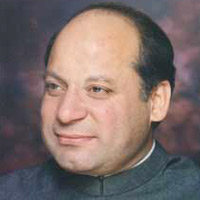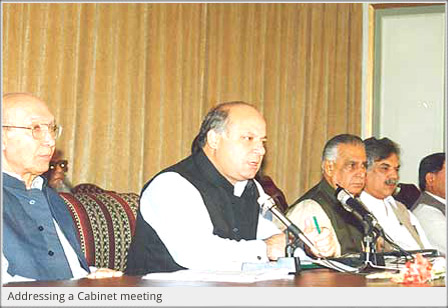
Muhammad Nawaz Sharif was born in Lahore on December 25, 1949. He is the eldest son of Muhammad Sharif, a joint owner of the Ittefaq Group of Industries.
Nawaz Sharif got his schooling from Saint Anthony’s High School. After graduating from Government College Lahore, he obtained his Law Degree from the Punjab University.
Nawaz Sharif remained a member of the Punjab Provincial Council for some time. He joined the Punjab Cabinet as Finance Minister in 1981. He was able to raise the allocation of funds for the development of rural areas to 70 percent of the Annual Development Program in the Province. He also held the portfolio of Sports and was able to reorganize the sports activities in the Province.
In the general elections of 1985, Nawaz Sharif won with an overwhelming majority, both in the National and Provincial Assemblies. On April 9, 1985, he was sworn-in as Chief Minister of Punjab. On May 31, 1988, he was appointed caretaker Chief Minister, after the dismissal of Assemblies by General Zia. Nawaz Sharif was again elected as Chief Minister after the 1988 general elections. A massive uplift of Murree and Kahuta was undertaken during his term as Chief Minister of Punjab.

On November 6, 1990, Nawaz Sharif was sworn-in as Prime Minister of the country, after his alliance, I. J. I. won the October 1990 elections. However, Nawaz Sharif could not complete his term of five years, and was dismissed by the President in April 1993. He was reinstated by the superior Judiciary, but had to resign along with the President in July 1993.
During his tenure as the Prime Minister, efforts were made to strengthen the industries with the help of private sector. Projects like Ghazi Brotha and Gawadar Miniport were initiated. Land was distributed among landless peasants in Sindh. Relations with the Central Asian Muslim Republics were strengthened and E. C. O. was given a boost. In an attempt to end the Afghan crisis, the “Islamabad Accord” was reached between various Afghan factions. His most important contribution was economic progress despite American sanctions on Pakistan through the Pressler Amendment.
Pakistan Muslim League again won the elections held in February 1997, and Mian Nawaz Sharif was re-elected as Prime Minister with an overwhelming majority.
Taking advantage of his absolute majority in the National Assembly, he added a landmark in the constitutional history of Pakistan by repealing the controversial Eighth Amendment. This Thirteenth Constitutional Amendment stripped the President of his powers, under Article 52(b) of the Eighth Amendment, to dismiss the Prime Minister and dissolve the National Assembly. He added another milestone to the Constitution when his Parliament adopted the anti-defection Fourteenth Amendment Bill. His development venture of the Lahore-Islamabad motorway has also been appreciated by a segment of the society, while others have criticized it for being an extravagance for a developing country.

During his second tenure, his working relationship with the apex court severed, and his differences with the Chief Justice came out in public. He also developed an uneasy relationship with the President, Farooq Leghari, who had earlier been his major political opponent. With the passing of the Thirteenth Amendment, the President was on a direct collision course with the Prime Minster. A few months later, this, and the dramatic confrontation with the Judiciary, culminated in the removal of the Supreme Court Chief Justice, Sajjad Ali Shah, and on December 2, 1997, the resignation of President Farooq Leghari.
On October 12, 1999, the civilian Government headed by Nawaz Sharif was overthrown by a military coup. Controversy over the Kargil operation, corruption charges, and the “Plane Conspiracy” case are considered to be the main reasons for his ouster.
After an extensive trial, Nawaz Sharif was charged and found guilty in the “Plane Conspiracy” case. On request of the Saudi Royal Family, the Government of Pakistan exiled him to the Kingdom of Saudi Arabia, where he now lives with his close family.
Several cases of corruption against him are still pending decision in local courts.














0 comments:
Post a Comment